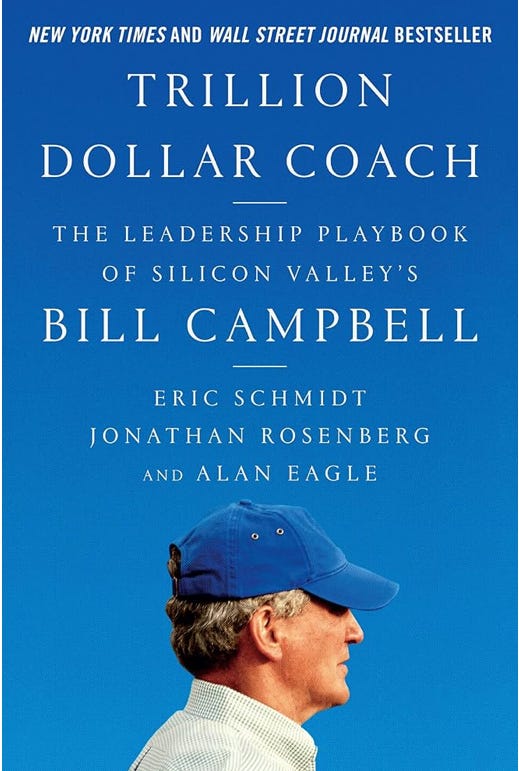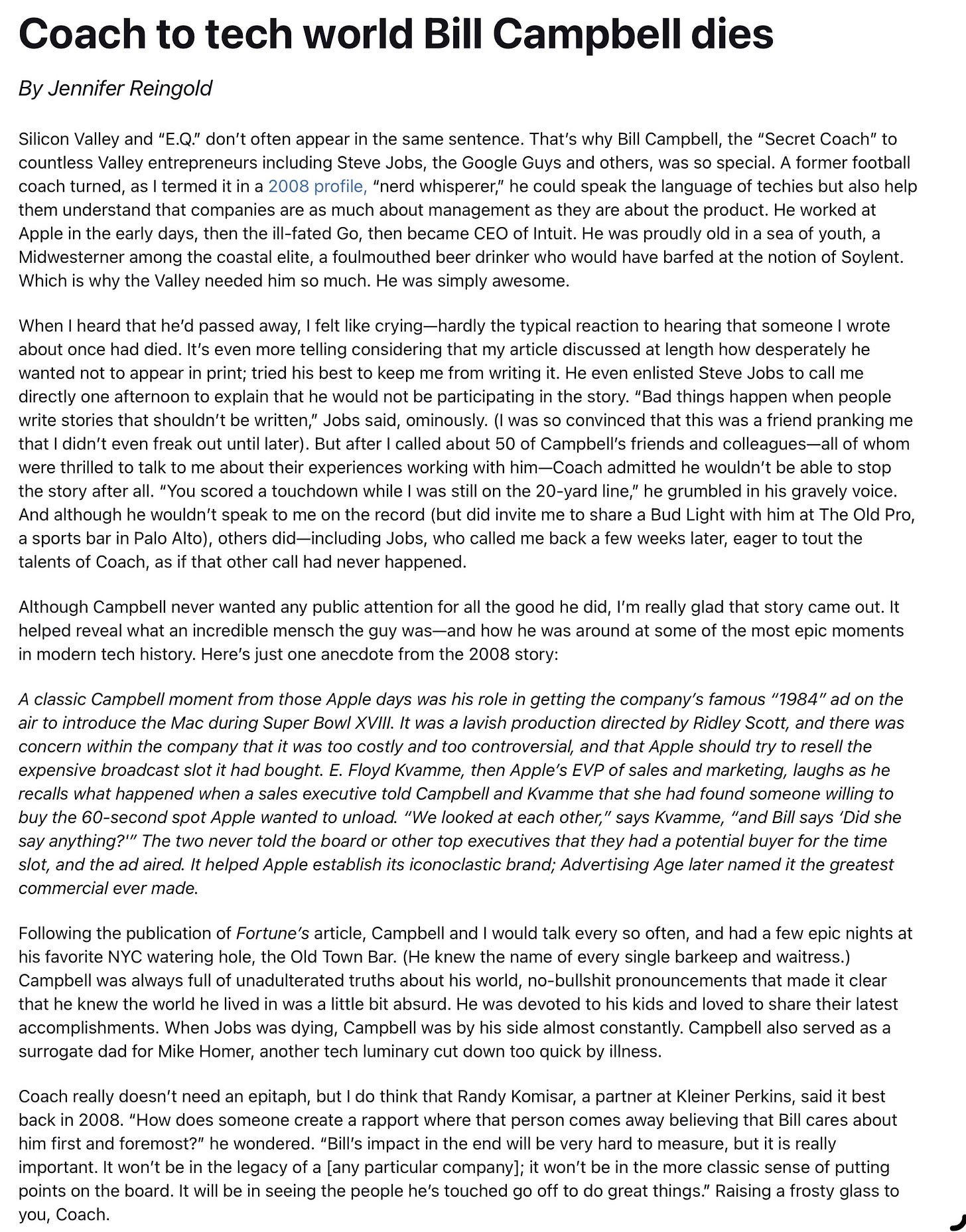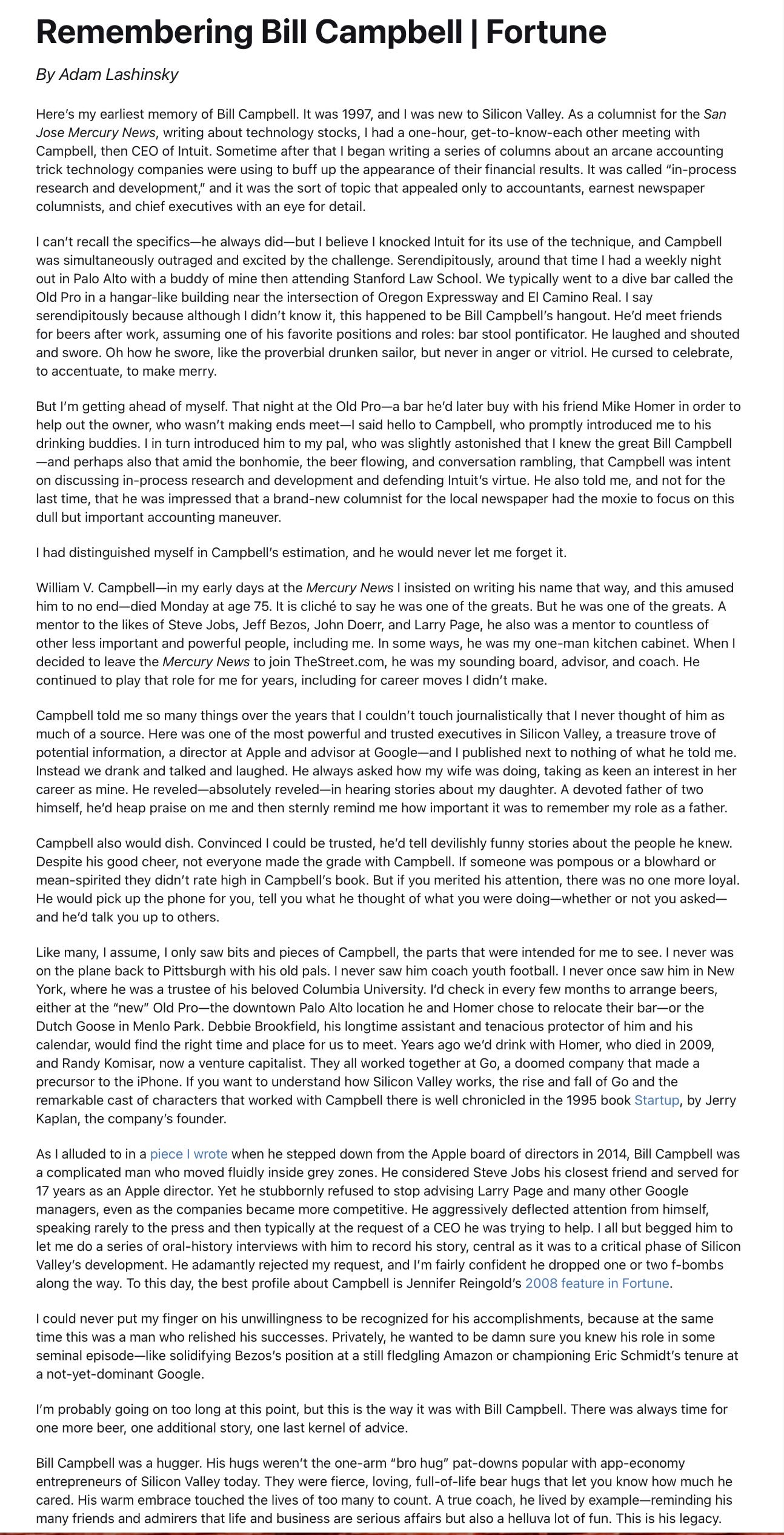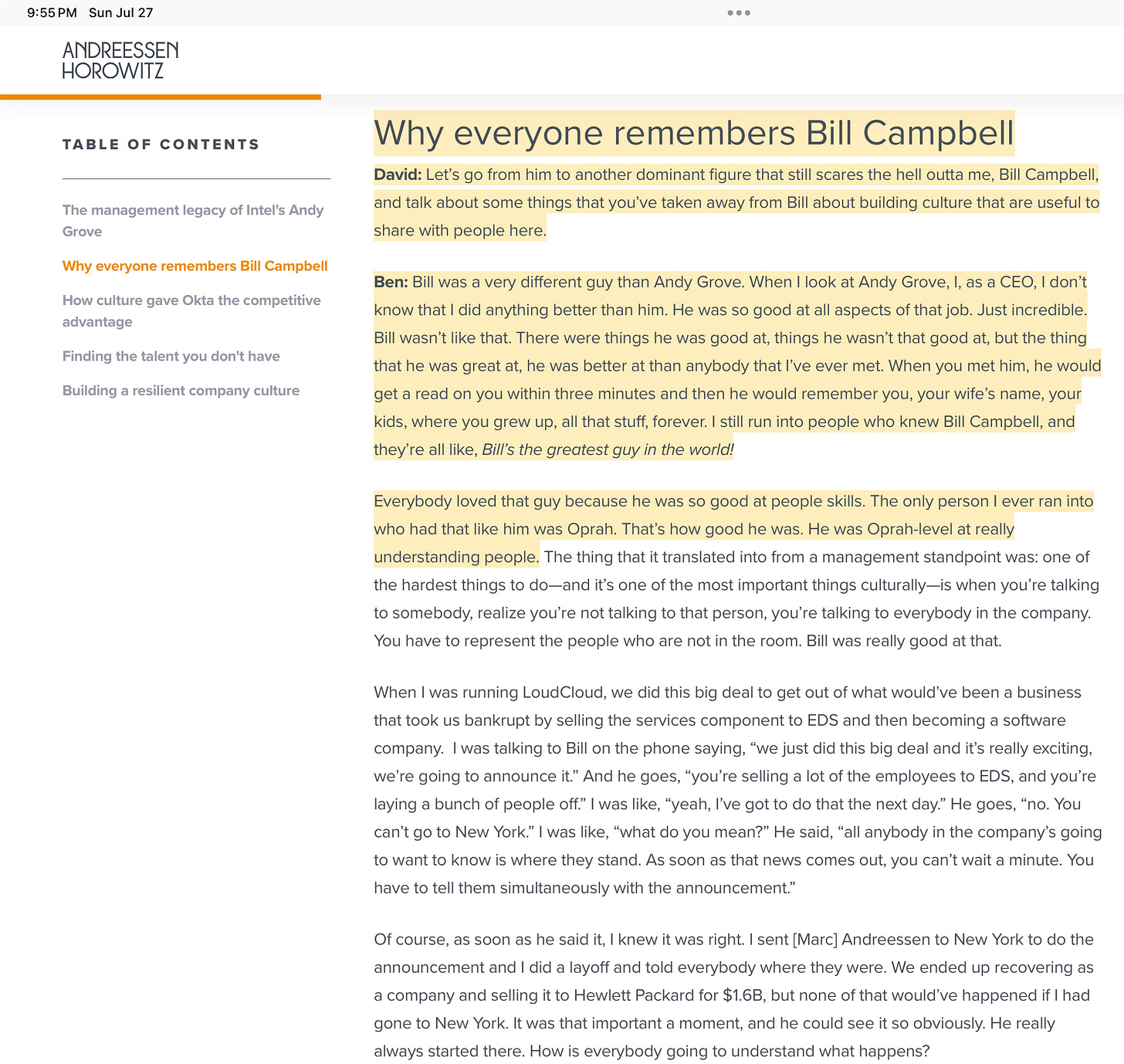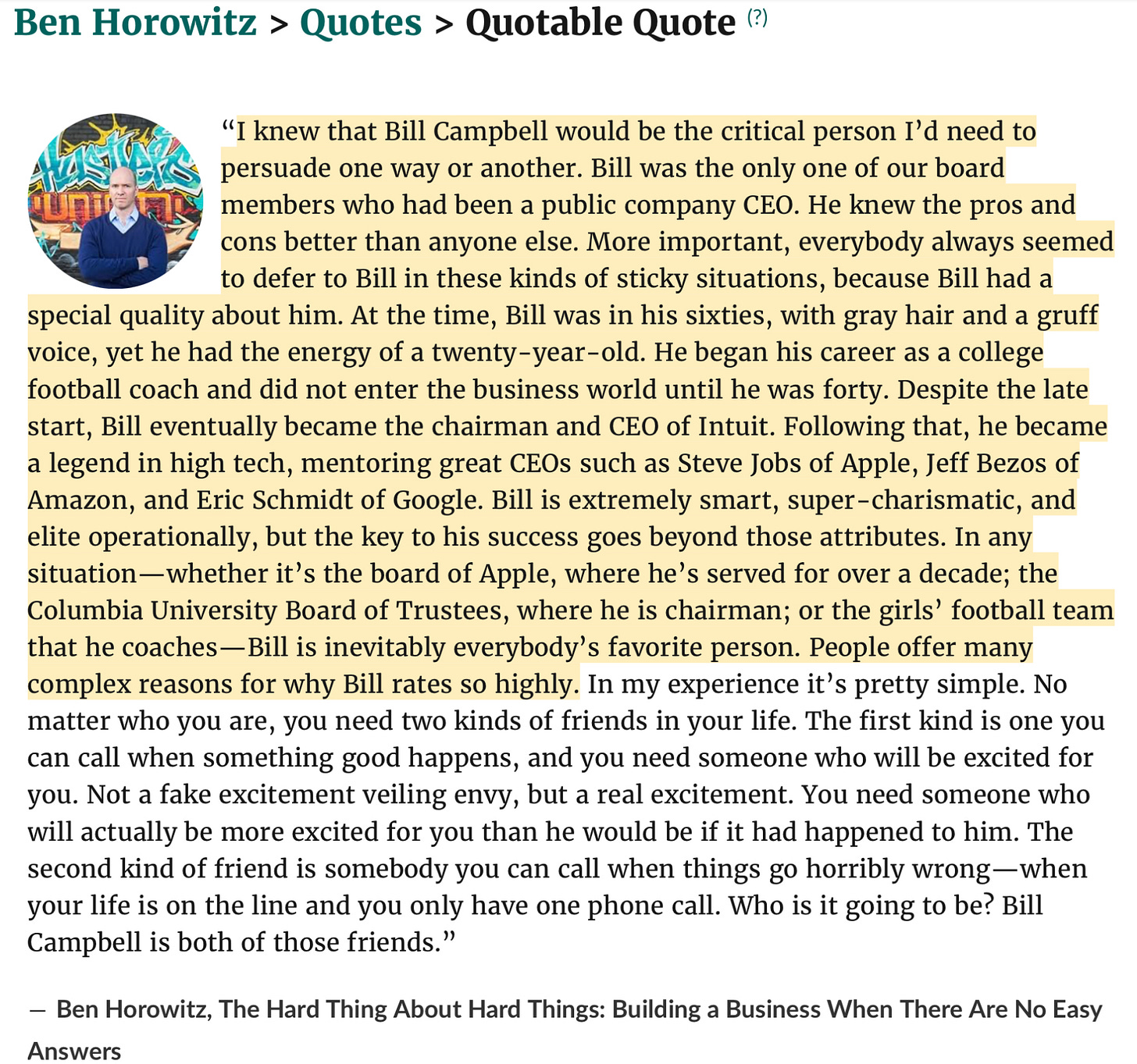How to Lead Like Bill Campbell: The Coach of Silicon Valley’s Greatest Teams
What Leaders Can Learn from Silicon Valley’s Most Legendary Coach
“Your title makes you a manager. Your people make you a leader.”
— Bill Campbell
Cook’s PlayBooks is proud to partner with Brex, the modern finance platform built for high-performing CFOs. Brex unifies global cards, expenses, travel, procurement, banking, and bill pay into one AI-powered solution, giving finance teams the visibility, control, and speed to scale. Get started today and see how your peers are getting more leverage from finance with Brex.
Introduction: From Football Coach to Silicon Valley Legend
Bill Campbell never wrote a leadership book, but he coached the people who did.
After he passed away, they wrote a book about him.
Steve Jobs. Larry Page. Jeff Bezos. Ben Horowitz. Coach Campbell was the quiet through-line behind Silicon Valley’s most legendary leaders. He wasn’t just another CEO or board member, he became best known for being the best coach Silicon Valley has ever seen and may ever see.
I knew Bill personally. He coached me from my “formative career years” at Intuit. They say having a great first boss is critical. Bill was one of my first and, as history would prove, one of the best. I feel blessed and lucky to have been in the right place at the right time and to have absorbed everything I could from him.
We talked at length about his football coaching roots and his playbooks both inside his office at Intuit and also at the Old Pro (a famous sports bar in Palo Alto where he held court multiple times weekly - but especially on college game day Saturdays). Bill’s playbooks consisted of discipline, trust, loyalty, and team-first execution. His authenticity (“being real”) made him one of the most respected leaders in Silicon Valley. He never sought the limelight. He did nearly all of his coaching behind the scenes; 1:1.
In the 25+ years of building teams after I left Intuit, I’m still trying to pay forward everything I learned from Bill. I did my best at Netflix, Mozilla/Firefox, and others.
Below are 8 leadership lessons I learned after being coached by Bill.
I’ve always resonated with the first one… his people-first mentality. Before Bill’s arrival, I had my fingerprints on the phrase “It’s the People” which became one of Intuit’s core values written all over the walls and website for 20+ years. This was after a core group of us project managed 400 employees’ inputs into key headlines that were the Operating Values component of Intuit’s famous VMOVA (Vision, Mission, Operating Values, and Achievements).
I realized my last post had a huge section on great sports coaches but none on the best business coaches. It’s a very short list, and I’m going to focus on only Bill for this post. This post is my attempt at paying it forward - Bill would have liked that.
8 of Bill Campbell’s Leadership Principles
1. Lead with Love (Yes, Really)
“It’s the people.”
Bill believed business was personal. He led with empathy, loyalty, and care, not as a “soft” strategy, but as the only path to unlocking the team and getting the team to win. He hugged everyone. And by everyone, I mean literally everyone. A big Bill Campbell bear hug was his calling card. Love and especially “Tough Love” was a key part of his playbook.
He asked about family all the time.
He asked and truly listened to your hobbies and interests.
He showed up when it mattered.
He cared about people first.
What I learned from Bill:
You don’t have to hug everyone or lead with love. But if you don’t show people you care, they won’t consider you a leader. Yes, have 1:1s. Don’t listen to the bullshit of “No 1:1s” going around Silicon Valley today.
If Bill were here, he’d say “F*!k, how the hell else are you going to get to truly know somebody?!” Investing time in people is one of your most important investments. Not investing this time 1 on 1 with your team… that’s extremely misguided and poor leadership.
P.S. Just because it’s a 1:1 doesn’t mean it has to be or should be all business or have a structured agenda. Create space in the 1:1s to ask, “How are you doing?” And then, “Tell me about your family.”
Bill teased those closest to him a lot. “Hey Cookie, did you get a lollipop with that haircut?” Or, “You’ve got meat cleavers for hands!” Or, “Get your head out of your ass - you can’t see anything from down there!”
“People don’t care how much you know, until they know how much you care.”
One of my favorite quotes - not Bill’s - but it reminds me of him every time I read it or remember it.
2. Coach the Team, Not Just the Player
In sports, the team is the focus… not the individual… or any one individual’s stats. Bill brought that mindset to the exec team.
He ran exec meetings like practices.
He blew the whistle when he needed to.
He called out solo and non-team behavior.
He demanded trust and loyalty over power.
What I learned from Bill:
Use your weekly staff meeting to strengthen team dynamics. This weekly time is more valuable than “just the agenda”. Check in on people. Check in on the team model -authenticity, transparency, trust, and accountability. This is how Bill did it. It works.
“We win as a team, and we lose as a team.”
From another amazing coach - Joe Moore - my high school soccer coach.
3. Give Hard Feedback with Deep Respect
Bill was famous for hugging you one minute and delivering a truth bomb the next.
He never let issues fester.
He told the truth, directly and quickly.
Tough love he called it. It came from a place of belief in you. You didn’t feel judged… at least I didn’t.
What I learned from Bill:
Direct your feedback by grounding it in caring for the person and their future. Try either Bill’s direct quote above or something like… “I’m giving you this feedback because I want you to succeed and I believe you need to hear this.”
“You’re better than this… and I know it.”
4. Protect the Culture Like the Offensive and Defensive Lines
Bill believed culture wasn’t just another part of the playbook… it was the core part of every game plan.
He crushed politics and ego whenever it showed up.
He removed “brilliant jerks.”
He built teams that wanted to win together.
What I learned from Bill:
Watch behaviors more than verbal statements. ”Actions speak louder than words””.
Who is lifting up the room?
Who hoards credit?
Culture enforcement is a daily leadership act… not an afterthought or something to fix later.
“You can’t get to the top if you don’t bring your people with you.”
5. Build Up Others
Bill had a title, but no ego. He didn’t need the spotlight. He just wanted the win.
He made others feel heard.
He shined light on unsung heroes and the “quite ones” (see the end of this post).
He played the long game of winning by creating and curating true teams.
What I learned from Bill:
“Am I creating space for others to be our future team leaders.”
“Am I highlighting the team win?”
I Imagine Bill saying something like this:
“You don’t have to be a coach, but you need to lead like one.”
But he did say…
“The path to success starts with people, and the best leaders never forget that.”
6. Only Coach the Coachable
Bill gave his time generously but only when he knew you also cared. If you weren’t willing to listen, learn, or be authentic, you weren’t part of Bill’s inner team. He called out assholes loudly.
You must be willing to work hard, get dirty, try and fail.
Be open to learning and asking questions.
Integrity without compromise.
Must be humble and self-aware.
Keep your commitments, be loyal, and tell the truth.
Don’t dance around the answer. Know what you know and say so. When you don’t know, simply say “I don’t know”.
What I learned from Bill:
Time is valuable and so is choosing who you hang around.
“Blowhards,” as Bill called them, are a waste of your time no matter how much money or power they have today.
“Know it alls” can’t be coached… don’t try.
“Learn it alls” are the best ones to coach.
“You can’t coach people who don’t want to be coached. You can’t coach someone who thinks they already have all the answers.”
7. “The Bill Huddle”
Those who knew Bill can probably still visualize Bill’s famous “clap” with his crooked pinky fingers and strong forearms and palms slamming together followed by his gravelly voice asking us to focus so we could start the meeting. It wasn’t just one clap… it was usually 3-5 claps. This was Coach’s way of refocusing attention. He also used it to cheerlead when he approved of something or a great idea he wanted to emphasize.
While I don’t remember specifically learning my “powerful questions” playbook from Bill, I do remember him asking a lot of them.
Here’s some questions I remember Bill asking during high stakes moments.
What’s really happening? What’s the story we’re telling ourselves?
What truth needs to be said that hasn’t been?
Who needs support? Who needs to step up?
What do we stand for? What are our 1st Principles?
What’s the very next play we can run with confidence?
What I learned from Bill:
The basics of leadership aren’t that hard.
Call the timeout; Huddle the team.
Remind the team of who they are and how they got here.
Refocus the team on winning not playing to keep from losing.
8. Pressure Reveals the Leader
Bill didn’t avoid hard moments. He relished them. He believed strongly his teams would come out stronger on the other side as long as they stuck together and played as a team.
As a modern leader, your version of coaching doesn’t require a whistle or a locker room speech. It requires a clear head, an authentic heart, and the courage to tell the truth in the toughest moments.
“In the long run, people will remember how you led when it was hard. That’s the legacy.
In the end, your legacy as a leader won’t be about your quarterly or annual results… it will be about how you showed up when the pressure was highest, and how many people you lifted along the way.”
What I learned from Bill:
In crisis moments, people need the truth.
They need to know what you know, what you don’t know, and when you will know it.
They need confidence and gravitas.
They don’t need a perfect plan.
They simply need a clear next step.
I saw firsthand how amazing a team can be under pressure when they knew winning wasn’t assured but they believed in the game plan.
“Don’t let the bitch sessions last.” <Percussive Clap, Clap, Clap, Clap> “Let’s go!” “We aren’t leaving this room without a plan.”
My First Tribute to Bill:
I first wrote about Bill with a post in Aug 2024 (just about a year ago) where I highlighted just a few of Bill’s great coaching moments. Focusing on the “Quiet Ones” and “Best Ideas Win”.
Here Are 3 More Tributes:
I’ll end this post by re-publishing three of the best of tributes to Bill shortly after he passed away in 2016. I’ve screenshotted them so you don’t have to click through or get hit with paywalls.
I’m sure you’ll notice many of the same themes above in the articles below. After you read them, you will feel like you also knew Bill.
Thanks Coach for everything! You’ll live forever here!
Goodbye, Bill Campbell by Jennifer Reingold
Remembering Bill Campbell by Adam Lashinsky
Ben Horowitz tribute to Bill Campbell
Sidebar Examples on Bill’s Crisis Coaching Techniques: Paid Subscriber Bonus:
Crisis Coaching: How Bill Campbell Led Through a Crisis:
“Leadership shows up strongest in the moments that suck the most.”
Bill Campbell was at his best not when things were easy, but when things sucked and the team was starting to doubt itself. Crisis Coaching was one of his greatest superpowers he learned as a football coach of Columbia University.
P.S. He did not have a winning record but it was clear he produced a winning team.
Football teams fall apart when the game plan breaks down. Business teams fall apart when confidence, trust, and clarity collapse. Bill’s approach in those moments? Anchor in values, rally around people, and simplify the next move.
Here’s how he handled the 3 most common types of crisis situations:
The Re-Org
The Missed Quarter; The Strategic Failure
The Broken Team; Toxic Behavior



